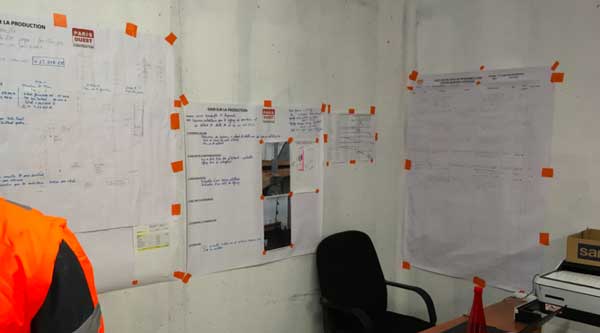Dear Gemba Coach,
How do I know if I have the right attitude during gemba walks? We’ve started doing them systematically, but many of our managers seem to be adding to the pressure on associates rather than making things better, and maybe I do too. Any help?
Thank you for this deep and great question. And yes, indeed, you are absolutely right. I’ve been giving it some hard thought and I feel I’ve got some elements of an answer although it’s hard to be definite. In the end, like any intense human interaction, it’s always going to be ambivalent, but let’s give it a go.
It’s hard to see oneself in action, and it’s hard to know what’s what if we don’t have a direction. In gemba walks, there are two simple – but not easy – directions we can keep in mind. As you intuited we either:
- Help employees by making their work easier or burden them by protecting the management status quo
- Bring value closer to customers or find solutions that bring value away from customers.
For instance, in a recent gemba walk, we realized that the lean coach had stopped visiting a site as often as she used to because 1) having been successful on one pilot site we’d asked her to scale up her efforts on other sites, and 2) she was finding the weekly travel to this site a real burden.
In this case, the two previous principles contradicted themselves. The site employees felt let down because they were very happy with the improvements they had achieved with this coach. Very concretely, she was very good at getting the company to fix practical issues for them and their productivity had improved without working harder by by fixing systems issues that hindered them daily. Their first-time-right quality and delivery had progressed visibly, and their work was easier. So, on the two previous directions this went well, but then the coach herself was overburdened by the travel and management decided to spread her efforts more widely, so the situation moved backward at that level. Never easy.
The obvious question was: how come the frontline staff couldn’t obtain help from corporate without the intercession of the lean coach?
Rather than let it go at that, we tried to think it through and by asking why repeatedly we found that it wasn’t just a matter of not daring to ask – or not bothering – it was also a question that the coach knew what to ask for more precisely, when the teams themselves didn’t.
Training for Autonomy
Let’s take a step back and look at the gemba of a construction company that has been practicing lean for over ten years.

The various documents on the wall retrace the exercises the project management team is asked to do:
- Problem-solving sheet: At least once a week, the team focuses on one concrete technical problem, expresses it, looks for a cause, and then studies the countermeasure.
- “Hoshin” document: One sheet of paper lists the critical success factors of this specific project, what the teams need to learn to succeed, and what to focus on to learn it.
- Milestones high-level plan: In order to visualize an 18-month project, the team is asked to visualize the whole thing on an A3, beyond the usual planning documents, to stay focused on the final delivery date.
- Detailed man-hour tracking: Shows where the resource goes daily.
- Detailed plan of coordinating contractors: A building has a lot of contractors going in and out and working at different speeds so the team is asked to plan in detail the interfaces and relays between contractors.
- Kaizen efforts: Looking for ways to add value during the project beyond what was originally defined.
If we forget about “lean” for a second but think in terms of engineering, these exercises are there to ask the construction engineers to think more precisely about topics they would otherwise slide over. The cumulated experience of the company is that if the project team focuses its attention on these details then the chances increase that the project will be delivered: 1/practical technical issues that can derail the plan, 2/gaps in knowledge that are essential to succeed in this specific project and learning as they go, 3/ understanding the impact of unforeseen events and schedule changes on the delivery date, 4/ following narrowly the “hours leakage” that occur in any complex project, 5/ developing a specific skill at coordinating contractors, 6/ constantly challenging habitual methods and looking for smarter ways of doing things,
Some teams, for instance, have additional visualization, such as a visual list of issues to green light with the architect before moving forward when the architect turns out particularly difficult to work with (yes, surprise, surprise, that happens).
The point is that this company is training its project managers to be more autonomous about these typical problems, which we know we’ll encounter on any construction project. This is what we mean by “in order to make products, first we make people.” By asking people to be more specific on point issues, we get them thinking differently about the whole job, and hopefully, develop their judgment and initiative.
What Do Frontline Teams Need to Know?
On the first gemba I mentioned, the lean coach understood the tools very well, and she drew conclusions for the team that she then went on to negotiate for them with corporate. Although this worked very well, during the gemba walk, we realized collectively we were completely missing the point. The point was that the teams themselves needed to better understand the issues in order to negotiate with corporate directly, and it was their manager’s job to help them do so, not the lean coach’s.
To think deeply about the question you’re asking, I’d suggest meditating on whether you, as a manager, have a clear vision of the typical problems the frontline teams need to know how to solve in greater detail to improve their overall way of working. The assumption we make here is:
People look at specific things in greater detail -> they understand the whole of their job better -> they make smarter judgment calls.
This is not an unreasonable assumption. On the whole, this is how science works and why we always need more precise measuring instruments – more powerful telescopes, microscopes or hadron colliders. But still, it rests on understanding the problems we need to look into.
Which is our part of the job on the gemba: can we get agreement on the specific problems that, if the team learns to solve them better, will help the team perform better by finding their own solutions (which we’ll help them to implement). Does that help?






